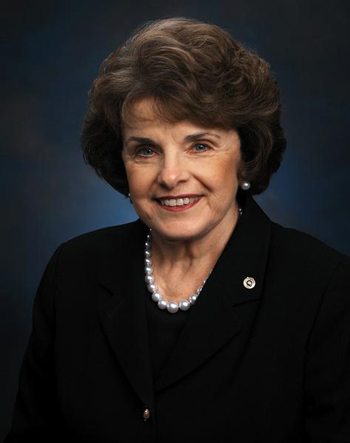April 6, 2020 - Washington - Senator Dianne Feinstein (D-Calif.) last week sent a letter to Attorney General William Barr questioning why high-ranking  Justice Department officials prevented federal prosecutors from bringing charges against Walmart for refusing to let its pharmacists block opioid prescriptions from doctors suspected of running “pill mills.”
Justice Department officials prevented federal prosecutors from bringing charges against Walmart for refusing to let its pharmacists block opioid prescriptions from doctors suspected of running “pill mills.”
The letter comes after ProPublica reported that Walmart appealed to high-ranking Justice Department political appointees to prevent federal prosecutors from bringing charges.
“In 2011, a DEA investigation found that a Walmart pharmacy in California had repeatedly filled opioid prescriptions from unlicensed doctors. In response, Walmart signed a Memorandum of Agreement with the DEA in which it pledged to implement procedures to guard against improper opioid dispensing,” wrote Senator Feinstein.
“New reporting indicates that despite this agreement, officials at Walmart’s corporate headquarters refused to let the company’s pharmacists block prescriptions from doctors believed to be operating ‘pill mills,’ including prescriptions that led to drug overdose deaths of customers in Texas.
“After a two-year investigation, federal prosecutors in the U.S. Attorney’s Office for the Eastern District of Texas informed Walmart that they planned to indict the company for violating the Controlled Substances Act. They were reportedly overruled, however, after Walmart appealed to high-ranking Justice Department political appointees.”
Senator Feinstein has long ensured that distributors, manufacturers and pharmacies responsible for the illegal diversion of opioids are held to account.
- In 2018, Feinstein’s Using Data to Prevent Opioid Diversion Act, which passed as part of the SUPPORT Act, increased penalties against manufacturers and distributors that fail to identify, stop and report suspicious orders of opioids.
- Last year, Feinstein introduced the Preventing Pill Mills Through Data Sharing Act, which builds on the Using Data to Prevent Opioid Diversion Act by extending reporting requirements and penalties to include pharmacies.
Full text of the letter follows:
April 2, 2020
The Honorable William P. Barr
Attorney General of the United States
U.S. Department of Justice
950 Pennsylvania Ave. NW
Washington, D.C. 20530
Dear Attorney General Barr,
This letter requests additional information regarding the Department of Justice’s efforts to ensure that pharmacies are not helping fuel the opioid epidemic by filling prescriptions under suspicious circumstances.
Studies show that sixty percent of adults who abuse opioids do not have their own prescription for the drugs, and instead obtain pills that have been diverted into the illegal market. [Beth Han et al., Sept. 5, 2017] In order to avoid such diversion, the Controlled Substances Act and its implementing regulations prohibit doctors from prescribing opioids for anything other than a legitimate medical purpose, and impose a “corresponding responsibility” on the pharmacist filling a prescription to ensure that the prescription is valid and legal. [21 C.F.R. § 1306.04; see 21 U.S.C. § 829 (c)]
While the Department has appropriately focused on the role of doctors in prescribing these medications, past enforcement efforts have also included wholesalers and pharmacies that have knowingly engaged in fraudulent prescription drug schemes or have otherwise failed to ensure that prescriptions are used for legitimate medical purposes. [See, e.g,. Indictment, United States v. Kordia et al, 19-cr-603 Doc. No. 1 (E.D. TX, Aug. 21, 2019); Indictment, United States v. Rattini et al, 19-cr-81 Doc. No .1 (S.D. OH, July 17, 2019)].
In 2011, a DEA investigation found that a Walmart pharmacy in California had repeatedly filled opioid prescriptions from unlicensed doctors. In response, Walmart signed a Memorandum of Agreement with the DEA in which it pledged to implement procedures to guard against improper opioid dispensing. [ProPublica, March 25, 2019; DEA-Walmart Memorandum of Agreement March 17, 2011]
New reporting indicates that despite this agreement, officials at Walmart’s corporate headquarters refused to let the company’s pharmacists block prescriptions from doctors believed to be operating “pill mills,” including prescriptions that led to drug overdose deaths of customers in Texas. Rather than empowering its pharmacists to cut off prescriptions from problematic doctors, the company reportedly decided that “driving sales and patient awareness is a far better use of our Market Directors and Market manager’s time.” [ProPublica, March 25, 2019]
After a two-year investigation, federal prosecutors in the U.S. Attorney’s Office for the Eastern District of Texas informed Walmart that they planned to indict the company for violating the Controlled Substances Act. They were reportedly overruled, however, after Walmart appealed to high-ranking Justice Department political appointees. [ProPublica, March 25, 2019]
It is important to understand why the U.S. Attorney’s Office was overruled in this case, particularly because the acting DEA director supported bringing charges. Notably, it appears that the Justice Department decided not to pursue charges despite the fact that it had established a Prescription Interdiction & Litigation Task Force designed to “use all criminal and civil tools at its disposal to hold distributors such as pharmacies, pain management clinics, drug testing facilities, and individual physicians accountable for unlawful actions.” [DOJ Press Release, Feb. 27, 2018]
It is likewise important to determine whether there is a loophole in existing law that requires reform and to rule out the possibility of political interference in the Department’s decision-making. I therefore respectfully request that by April 24, 2020, the Department provide records reflecting the initial charging recommendation and the role of political appointees at the Department’s headquarters in declining to pursue charges.
Thank you for your prompt attention to this request.
Sincerely,
Dianne Feinstein
United States Senator
cc: The Honorable Lindsey O. Graham
Chairman, Senate Committee on the Judiciary
Source: Senator Dianne Feinstein








